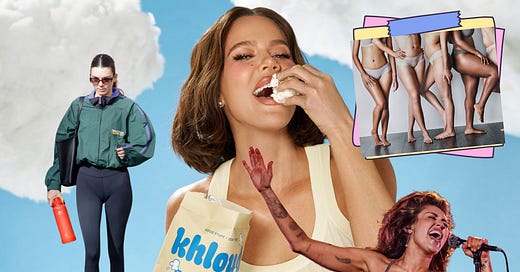Content warning: weight loss, disordered eating, Kardashians
The last time I wanted to lose weight was 2022. I was just emerging from the crash-and-burn of my run for city council, a campaign that took more out of me than I even realized at the time. By the final months, I needed 10mg of melatonin, 20 minutes of meditation, a pillow under my feet and another between my knees, and a Calm app sleep story1 to fall asleep for even a few hours. Which was bitterly ironic since, as an introvert, I was expending massive amounts of energy talking to people every day. So I was utterly drained of energy, but too frazzled to ever rest. All of this was compounded by the fact that, since I ran in 2021, I had spent the previous year more inside than I had ever been.
I used to hate every picture of myself from 2021. (Self-compassion is, shockingly, not one of my strong suits.) I was ill-at-ease in my body, and as the campaign got progressively more xenophobic and queerphobic, ill-at-ease in the place I had chosen as my home. I look at pictures from that time and I can see all the unspoken disappointment and uncertainty physically weighing me down.

Even at the beginning of that year, when I told my primary care physician that I was experiencing stress hives for the first time in my life (courtesy of the dual stresses of buying a house and beginning a political campaign), she responded by telling me how much weight I had gained since February 2020.2 By 2022, that extra weight didn’t feel like mine. It didn’t feel like grown woman weight, a natural part of aging that I’m way more at peace with. It just felt like grief, and I wanted it off of me.
At the same time, I never gave myself a specific “weight loss” goal. I didn’t stop eating desserts or carbs. I did, however, dust off my Peloton subscription3, buy a rowing machine4, and re-commit to spending the free time I got back on the things that make me happy. And those things have always included physical activity, because I’m a little jock at heart.
Somewhere along the way, I also got re-invested in strength training. Not the power lifting of my pre-pandemic days, which was extremely fulfilling but also extremely good at reactivating the disordered eating of my early 20s. Not pilates either, which was really fun the one time my sister took me to a class, but would require me to take an additional step and leave the house.
I’ve been sticking with strength classes on my little Peloton app, which I can do in my house, and which just require dumbbells and kettlebells and sometimes, worst of all, just my own bodyweight. (I fucking hate push-ups.) It has felt amazing to go from using 8- and 10-pound weights to 15- and 20-pound ones. To tell the difference in my rowing a day or two after I’ve done a ton of single-leg deadlifts. And to see how big and visibly strong my thighs have gotten. So much so that I’ve found myself getting drawn in by the siren song of Big Protein.
Americans are preoccupied with getting enough protein, which is funny when you consider that we consume much more than we really need. We are doing fine, protein-wise. But a lot of us are convinced that we need to get more.
recently gave some necessary context to my journey here, too: more and more of us are getting into strength training, which does benefit from and stoke cravings for a high-protein diet. And one of the thrilling benefits of strength training, according to fitness influencers everywhere, is how great it is for making you less fat. Because that’s always, secretly and not so much, been the goal of any fitness trend or wellness framework.After the reign of Body Positivity, where millennials in particular tried to talk around the fact that we wanted to lose weight, it seems we’re diving back into overt Body Policing. We’re using “big back” as a euphemistic insult. We’re trying to get Pilates Arms and Leggings Legs. We’re watching a Kardashian put protein in popcorn. It all feels so sadly familiar. Our collective Y2K nostalgia has awoken Y2K body image issues.
I like to think that I’m immune to this kind of thing, now that I’m nearly 40 and internalized as much body positivity as I could. But of course, I’m not. Protein’s PR campaign got through to me, after all. We are all susceptible to propaganda, especially propaganda that’s well-designed enough to repackage our insecurities and capitulations to the status quo—double chin surgery, diabetes medication as a weight loss hack—as empowering choices. So since I read Mikala’s essay, I’ve been trying to get to the bottom of this: how much of my excitement about getting more muscular is actually about getting less fat? And how guilty would I feel if I acknowledged that?
Keep reading with a 7-day free trial
Subscribe to Teniade Topics to keep reading this post and get 7 days of free access to the full post archives.





